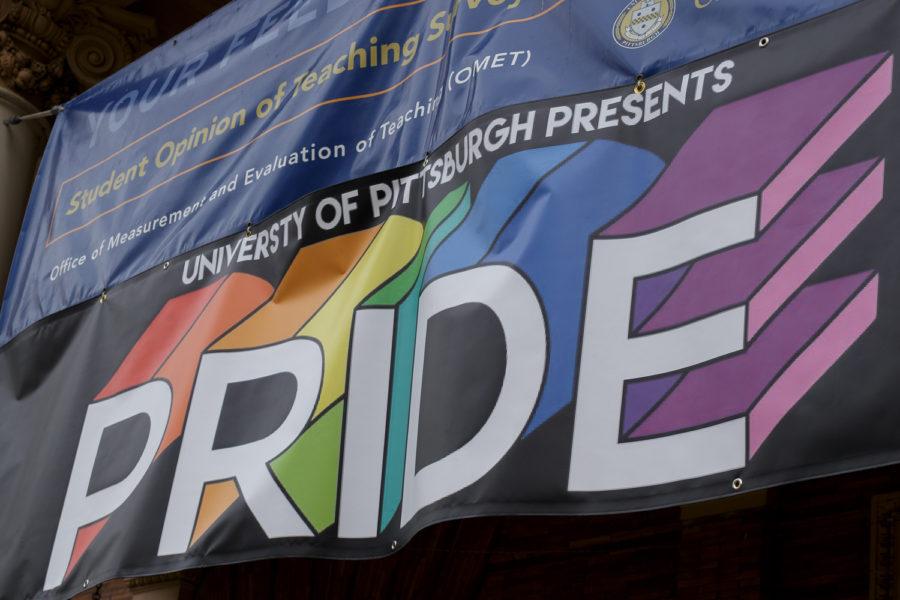Campus organizations host first Pride month
Thomas Yang | Assistant Visual Editor
Pitt Pride banner outside of the William Pitt Union.
April 9, 2019
Pitt’s campus is home to many LGBTQ+ organizations — Rainbow Alliance, oSTEM and the Gender and Sexuality LLC, to name a few. But until this year, none of those organizations came together for a large-scale project celebrating Pitt’s LGBTQ+ community as a whole.
Now, in collaboration with PPC, Residence Life and SGB’s nascent Diversity and Inclusion Committee, Pitt presented its first ever Pride lineup — a series of events April 1-20 celebrating the LGBTQ+ community on campus.
SGB’s diversity and inclusion chair Tabitha Barnes said Pitt’s first Pride is all about bringing attention to the Pitt’s LGBTQ+ community.
“It’s about recognition,” Barnes said. “I don’t think a lot of people recognize how big and vibrant the LGBTQ+ community on campus is.”
Besides the typical events put on by Rainbow Alliance every year, like the drag show and Rainbow Voices Poetry Slam, the lineup contains quite a diversity of other offerings, including a History of Pride Discussion, a student fashion show and a screening of the movie “Boy Erased.”
Ryan Ferrante, the resident assistant for Pitt’s Gender and Sexuality LLC, said he’s most excited for Deconstructing the Rainbow, a tabling event where LGBTQ+ students can express their gender and sexual identities using art.
“It’s just a really interesting concept,” Ferrante said. “I think next to all of the discussion-based events we have on the calendar, art is something we can use to get to know each other when we don’t have words to express ourselves.”
Several of those discussion-based events, like History of Pride and a roundtable discussion on April 9 that will allow attendees to explore “experience and identity,” are designed to bring the LGBTQ+ community on campus closer together, according to Madhu Mahesh, who heads the LGBTQ+ committee within SGB’s Diversity and Inclusion Committee.
Ferrante said those particular events bring a more formal arrangement to the everyday discussion he has with LGBTQ+ students in his LLC, and that it’s important to open up the dialogue to a wider audience on campus to share stories with other queer students, or to help educate non-LGBTQ+ students about how they can be an ally to the community.
To Ferrante, the Pitt community is usually inclusive of the LGBTQ+ students, but there are always opportunities to improve.
“I’ve heard professors use slurs when referring to queer students. I’ve heard one case where a professor didn’t know the LGBTQ+ acronym and instead referred to us as alphabet people,” Ferrante said. “Having these discussions is just a great opportunity to educate.”
Barnes supports the idea of educating allies, but she said this particular Pride lineup is targeted toward the LGBTQ+ community at Pitt.
“We’re trying to focus on the LGBTQ+ community specifically this year,” Barnes said. “I think we offer a lot of options for allies to get involved throughout the year.”
Part of that focus for Pitt’s inaugural Pride is helping LGBTQ+ students find job opportunities. The Pride networking event on April 10 is coordinated by Sam Bunke, president of oSTEM, an organization for LGBTQ+ students in STEM. The event aims to connect LGBTQ+ Pitt students to other LGBTQ+ professional in the area. Bunke said making these connections is important, since LGBTQ+ people often don’t know if their working environment after college will be inclusive.
“I think college is usually pretty inclusive — and if it’s not, you can find your niche that will treat you with respect,” Bunke said. “But when you’re thrown into a job, you have no idea how your employer will treat you.”
Despite all of the new events unveiled specifically for Pitt’s LGBTQ+ community this year, some LGBTQ+ students, including Jeffrey Lombardo, don’t plan on attending — they’re placing academics first.
“I’m not planning to go to Pitt Pride as finals loom,” Lombardo said. “But I do think it’s an important first step in working towards inclusivity.”
Lombardo said the collaboration effort between several different LGBTQ+ organizations and administrative groups on campus proves Pitt Pride is “not just a publicity stunt to make Pitt seem like a queer safe haven.”
In future years, when the committee has more time to plan the Pride calendar, it may take into account student feedback, Barnes said. The committee will try to schedule events that garner the most student interest, at a time of the year when they’re most willing and available to attend.
But to Ferrante, Pitt’s inaugural Pride represents a milestone in Pitt’s road to greater progressiveness and inclusivity.
“Obviously, this is an opportunity to bring all the LGBTQ+ organizations on campus together,” Ferrante said. “But it’s more than that. Now that we’re more connected as a community, we can turn our focus outward and educate the rest of Pitt, too.”



